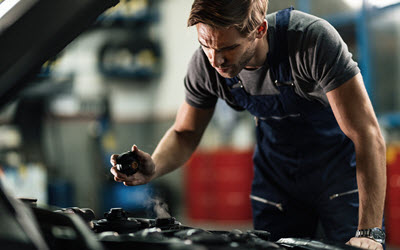The radiator in your Volkswagen plays an integral role in keeping your vehicle running smoothly and efficiently by cooling the engine. The radiator accomplishes this by releasing excess heat through its network of pipes. These pipes contain a solution, combining water and antifreeze, which absorbs heat from the engine as it passes through. Once cooled off, the liquid is then circulated bacz to the radiator, where it continues to cool down until it reaches the right temperature.
This simple action keeps your Volkswagen engine operating at optimal levels and helps prevent any costly damages or repairs. However, your radiator can develop leaks for a variety of reasons. When this happens, it can leave you wondering what to do.
Pull Over Safely and Let Your Engine Cool for 30 Minutes
If your radiator is leaking, the first step is to identify the source of the leak and determine the extent of the damage. This should be done at least 30 minutes after turning off the engine to ensure you are not burned by extremely hot steam from the radiator. Pull over safely and wait for the heat to disperse, then look for the leak.
Identify a Leak or Need for Additional Coolant
First, check under the front of the engine on the ground or pavement to see if you can visualize a puddle of coolant. This is usually brightly-colored fluid to make it easy to differentiate between other fluids like oil or gasoline.
If you see pink, green, or blue-colored coolant, you most certainly have a problem with the radiator. If there is a minor crack in a pipe or line, it could be fixed by a sealant. However, if the leak is significant or the radiator itself is damaged, it may need to be replaced.
If you do not see coolant leaking, but there was steam rising from your radiator previously, you may add coolant to maintain the proper level once the engine is cooled down. Be sure not to overfill the reservoir, as this can cause the coolant to become pressurized and lead to further leaks.
Drive carefully to our shop or the nearest garage for help, but do not drive your Volkswagen without coolant, as you could damage the engine to the point that it warps metal parts, leaving you with a huge repair bill.
Common Causes of a Radiator Leak
Now you know what to do if you have steam rising from your engine due to a radiator leak, but you may wonder why radiator leaks happens:
- Age and wear-and-tear: Like all parts of a vehicle, radiators wear out over time. The constant expansion and contraction of the metal due to temperature changes, as well as exposure to harsh elements such as road debris, can cause the radiator to crack or develop holes. As the radiator ages, it becomes more susceptible to leaks, especially if it has been neglected or not properly maintained.
- Overheating: Overheating can cause a radiator to leak. When the engine overheats, the metal in the radiator expands and can cause cracks or holes to form. If the overheating is not addressed quickly, the radiator can become damaged beyond repair and will need to be replaced. It is important to have the engine checked for any potential causes of overheating, such as a faulty thermostat, water pump, or fan, in order to avoid further damage to the radiator.
- Corrosion: Corrosion can also cause a radiator to leak. The radiator is filled with coolant, which contains water and antifreeze, and this mixture can become corrosive over time, especially if the coolant is not properly maintained or changed on a regular basis. Corrosion can also occur if the coolant becomes contaminated with dirt or debris, or if the radiator is not protected from road debris and salt.
- Impact damage: Impact damage from road debris or a collision can also cause a radiator to leak. This type of damage can be caused by a small rock or piece of debris that hits the radiator, or it can result from a more significant impact, such as a collision with another vehicle. In either case, the impact can cause the radiator to crack or develop a hole, which will result in a leak.
Volkswagen Experts: Hagan’s Motor Pool
If you are experiencing a radiator leak, it is  important to have it checked by a professional to ensure that the problem is properly addressed and that your vehicle continues to run smoothly and dependably. Visit us today if you are in or near Alton, Barrington, Berwick, Dover, or Rochester, NH.
important to have it checked by a professional to ensure that the problem is properly addressed and that your vehicle continues to run smoothly and dependably. Visit us today if you are in or near Alton, Barrington, Berwick, Dover, or Rochester, NH.

